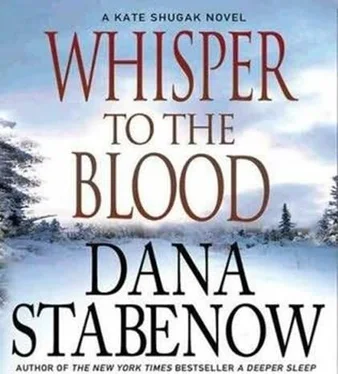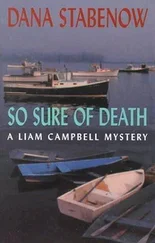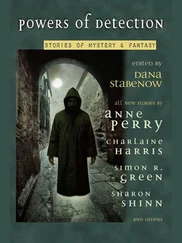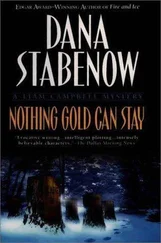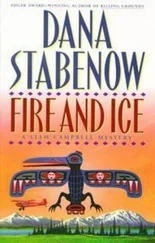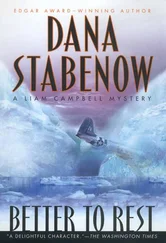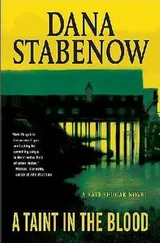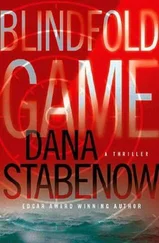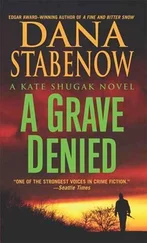But not out of Dodge, as it turned out. One step into the Roadhouse she walked slap into Martin Shugak, who smirked at her. "Madam Chair. Got a motion I'd like to run by you. Or do I mean over you?"
She told him what to do with his motion and marched up to the bar, ears burning from the snickering that came from Martin's knot of misfits, malcontents, and misdemeanors in waiting, a group that encouraged Martin to temporarily forget all the ways she could hurt him if she put her mind to it.
"Kate," Bernie said. He'd undoubtedly heard the story, too, but he was a little wiser in the ways of Kate Shugak than Martin was and he refrained from comment. With her usual insouciance Mutt reared up, paws on the bar, and panted at Bernie, who snagged the usual package of beef jerky and tossed it her way. He put a can of Diet 7UP and a glass full of ice in front of Kate and moved down to the end of the bar, where Nick Waterbury sat, arms around what appeared to be not his first beer of the day. She frowned and checked the clock on the wall. Not even three o'clock. Nick was a lot of things but he wasn't a boozer. "Hey, Nick," she said. "How you doing."
"Fine, Kate. No worries." He didn't look up and his dreary voice contradicted his words. "How's Eve?"
"She's fine. We're just fine."
Since they'd lost their daughter Mary two years before at the hands of Louis Deem, who had walked on the charge, Kate doubted the veracity of that statement. "Tell her I'll be out in a couple of days. I'm jonesing for her coffee cake."
"Sure," Nick said. "Whatever."
Now that it seemed safe Bernie slid back down the bar. "How are you holding up?" she said.
He didn't blow her off and he didn't sugarcoat it. "I'm maintaining."
"Just maintaining?"
"It'll do. For now, it'll have to."
"The kids?"
He thought about his answer for a moment or two. "Quieter," he said finally.
"That doesn't sound good."
"It isn't," he said without rancor. He raised a hand, palm up, and let it drop. "But what can we expect. Their mother and brother were murdered last year. And they don't even get to spit in the eye of the asshole who did it."
"At least he's dead," Kate said.
Bernie met her eyes, his own empty of expression. "That he is."
God, it was cold. The frigid air bit through the windshield of the snow machine and all five layers of his clothing with the ferocity of a wolverine biting into flesh, and it felt just that hungry, that angry, and that voracious. He wore a balaclava and a knit cap inside his hood and his face was still cold. Beneath his down parka with the wolf-trimmed hood and a down bib overall guaranteed to twenty below, he wore a Gore-Tex Pro Shell and a pair of ski pants, and beneath them Patagonia Capilene, the ne plus ultra in long underwear. His boots were Sorel Caribous rated to forty below, and inside his winter mitts he wore heated gloves powered by a D battery guaranteed to keep his hands warm for five hours, minimum.
Nevertheless, the only truly warm part of his body was in fact his back, and that was because Van was snuggled against it, her arms wrapped tightly around his waist. "You okay?" he yelled over the noise of the engine.
"Great!" she yelled back. "Isn't it gorgeous?"
She could talk, she was all warm and comfy back there with him as her wind foil, but she did have a point.
The white swath of snow-covered ice wound through a landscape of low banks and rounded foothills. Thick stands of willow flashed by, leaving Johnny with retinal after-impressions of enormous brown lumps, moose in groups of four and five, curled up in the snow, conserving energy, waiting out the cold snap before they got up to feed again. High overhead, a bald eagle soared, looking for the unwary rabbit or that foolish pika who had been improvident in preparing for winter and whom hunger had forced out to feed. Eagles mostly ate fish, Johnny knew, but with the Kanuyaq frozen solid and the salmon out to sea anyway the eagles made do with what was on the ground. Or in the garbage dump. Maybe Benjamin Franklin was right, maybe the turkey should have been the national bird.
It was a clear, cold, calm day, the sky a pale, sere blue. The sun was up after ten and in bed before four, and in the few brief hours that it traveled above the horizon its reflection off the snow felt sharp enough to draw blood. They all wore goggles with polarized lenses to guard against snow blindness.
Ahead of them Ruthe goosed her Arctic Cat with the verve and enthusiasm of a woman half her age, following truck trails when there were any, breaking new trail where the wind had blown the snow into sculptured drifts that were so beautiful and otherworldly that it seemed a shame to Johnny to destroy them. Ruthe skimmed their tops or plowed through their bases without a backward glance, resulting in explosions of snow that momentarily obliterated the trail. When now and then he managed to pull even with her he could see the grin beneath her goggles. "She's loving this," Van shouted.
He felt an answering grin spread over his face. "Yes, she is!"
There was traffic on the river that day, other snow machines as well as pickups and four-wheelers and one guy on cross-country skis towing a sled. When asked, he said he was from Anchorage, just out for a weekend wilderness experience. He seemed rational, which was unexpected, and shared with them some homemade fudge that even frozen solid melted in the mouth like chocolate silk. It could have been a highway anywhere north of the fifty-three, if there wasn't the occasional guy fishing through a hole he'd chopped in the ice, hoping for a mess of whitefish for dinner.
The others were inhabitants of the villages they passed, isolated clusters of log cabins and small prefabricated buildings brought up- or downriver at great expense, for most of whom their airstrip doubled as main street. Usually downtown consisted of a tiny store with inflated prices and an even tinier post office in someone's front room. Most had a government building that might also house the rare village public safety officer and whatever air taxi flew there. They all had schools, in spite of steadily dwindling school populations as more and more people moved to where the jobs were. Johnny had heard that topic discussed by the four aunties more than once. He wondered if the mine would help, if it would stop the drift of Alaskans from the rural to the urban world. He knew Kate didn't think so. "How do you keep them down on the farm," she had said once in his hearing, "after they've seen what's out there on satellite television?"
They didn't stop to talk, though, so he couldn't ask the people who lived there how they felt about it. One group of three, all wearing helmets, circled around and came back by them, and then circled again and roared by a third time. A pickup came into view, and the three jumped a low section of riverbank and disappeared into a stand of spindly spruce trees.
"Who was that?" Van said.
"Dunno," Johnny said, "but they sure know how to drive snow-gos." He was nagged by the feeling that there was something he should have made notice of. He faced forward to see Ruthe going up the bank on the opposite side of the river. "Hold on, Van!"
He followed Ruthe's tracks off the river and over the bank and found her waiting at the top. "Still good?" she said.
"Still good," he said. He might be cold but he wasn't frozen, and he was enjoying the feel of Van's arms around him. He could keep going all day.
"Okay," Ruthe said, and off she hared again, he and Van faint but pursuing. They climbed for almost a mile, Ruthe perforce slowing down for safe passage through giant and mostly dying spruce trees crowded by thickly growing birches, all on the south-facing slope of what resolved into a high valley. Once in it, mountains rose up on either side to give it a wide, exaggerated U shape edged with sharp peaks, notched peaks, double peaks four and five and six thousand feet high. They were in the foothills of the Quilaks.
Читать дальше
